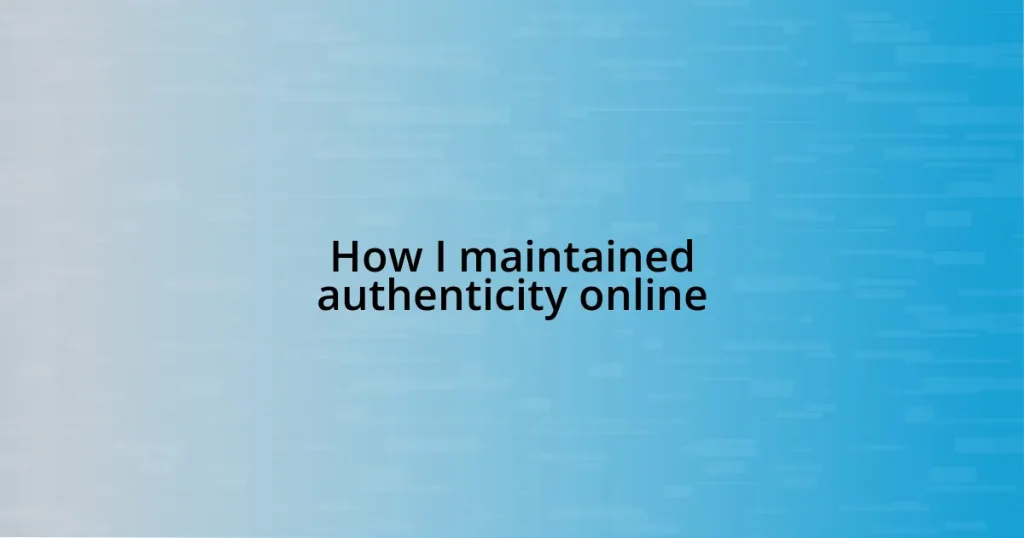Key takeaways:
- Authenticity online involves embracing vulnerability and sharing both successes and struggles to forge genuine connections with others.
- Self-awareness is essential for guiding content and cultivating a sense of trust with the audience.
- Identifying core values helps maintain authenticity amidst evolving online trends, allowing for more meaningful content creation.
- Engaging genuinely with the audience through active listening and personal interactions fosters a sense of belonging and community.
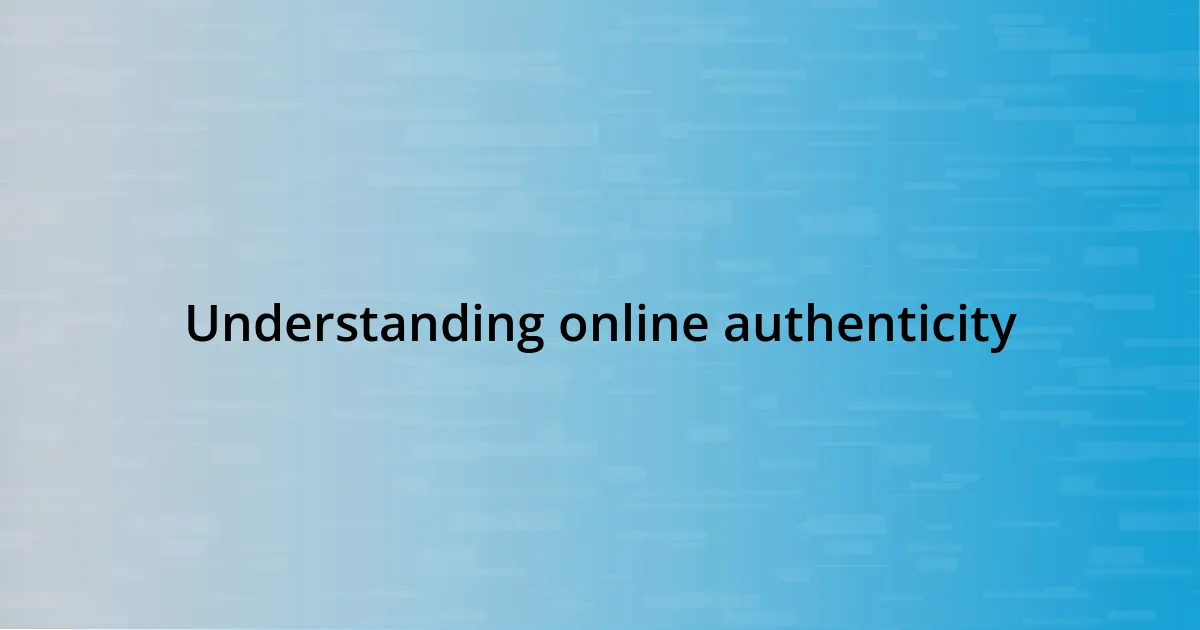
Understanding online authenticity
Authenticity online is about being true to yourself, especially when so many voices are vying for attention. I remember the first time I posted something deeply personal on social media. I felt a swirl of anxiety—what if people judged me? It was in sharing my vulnerability that I discovered a genuine connection with others, which reinforced my understanding that authenticity can create powerful bonds.
When I scroll through my feeds, I often wonder: how many profiles reflect true selves versus carefully curated personas? This reflection leads me to realize that the pressure to fit a certain mold can be overwhelming. I’ve found that sharing not just my triumphs but also my struggles gives a more honest view of who I am, which resonates more profoundly with others.
In my experience, the journey to authenticity online is not always straightforward. I still recall moments where I hesitated before hitting ‘post,’ worrying about how my thoughts would be perceived. Yet, I learned that being genuine isn’t just about sharing what is easy; it’s about embracing the messy, unfiltered aspects of life that make us human. This duality enriches the online experience, fostering a community that values depth over gloss.
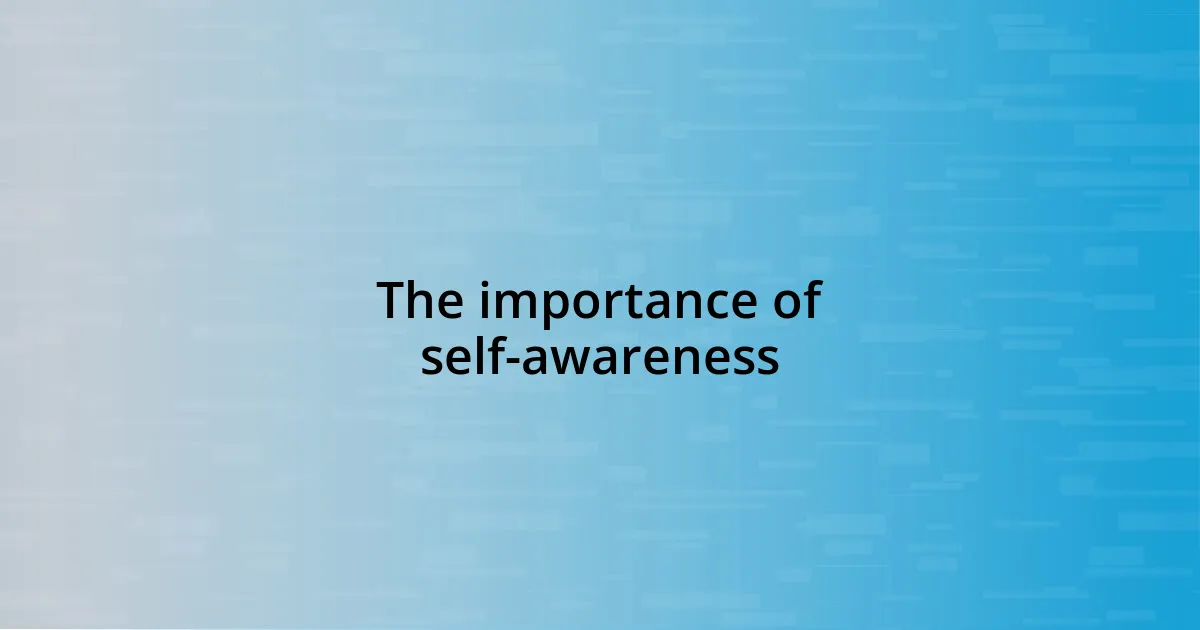
The importance of self-awareness
Self-awareness plays a crucial role in navigating the online landscape. When I started sharing my thoughts publicly, I took time to reflect on my values and beliefs. This process of understanding myself not only guided my content but also helped me feel confident in my expressions. I realized that being aware of my strengths and weaknesses significantly influenced how I presented myself online.
Further along, I encountered instances where my self-awareness was tested. There were times when I felt the urge to conform to popular opinions, but my internal compass reminded me of my genuine perspectives. I’ve learned that when I stay true to my authentic self, my engagement with followers increases because they can sense that I’m not just conforming to a trend—I’m being true to who I am.
While exploring the nuances of self-awareness, I’ve come to appreciate its direct connection to authenticity. Each time I took a moment to evaluate how I was feeling before posting, my content became more relatable. I encourage you to ask yourself: How does your online presence reflect your authentic self? In my case, the result has been a deeper connection with others who relate to my journey.
| Aspect | Self-Awareness |
|---|---|
| Definition | Understanding one’s own thoughts, feelings, and values. |
| Impact | Guides genuine expression and builds trust with an audience. |
| Process | Involves self-reflection and evaluating experiences. |
| Outcome | Creates deeper connections and a stronger sense of community. |
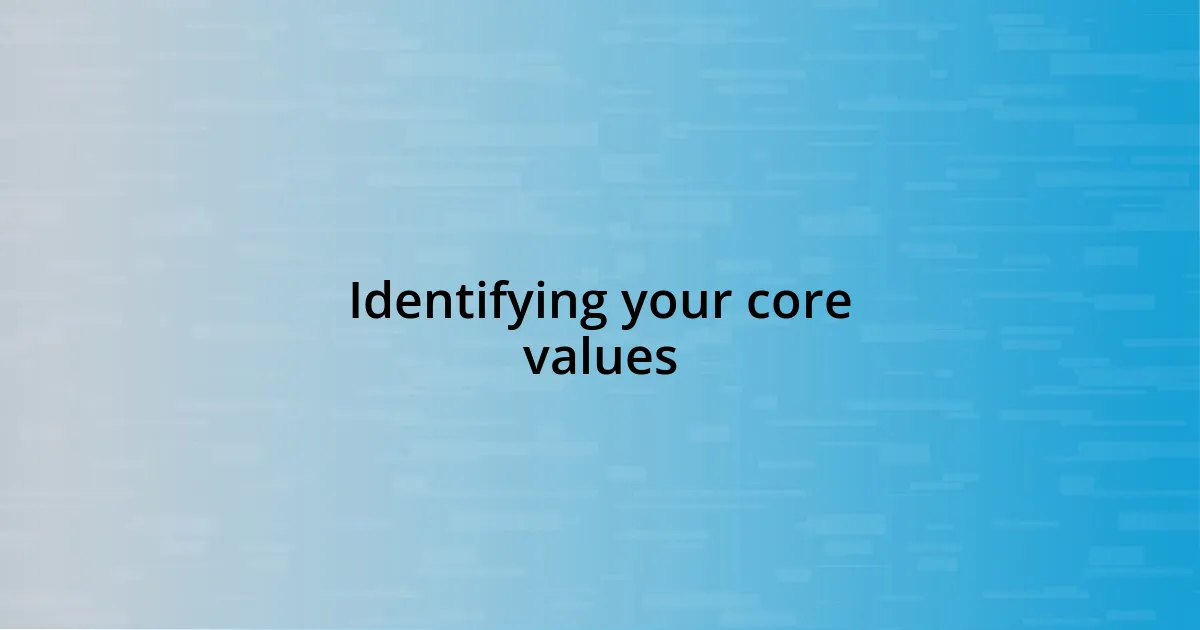
Identifying your core values
Identifying your core values is a pivotal step in maintaining authenticity online. I remember a particular moment while jotting down my beliefs on a notepad. As I penned each value, I felt a sense of clarity wash over me. It was as if I was stripping away the noise of external influences and revealing my true self. This process empowered me to curate content that truly resonates with my identity and experiences, allowing me to connect on a more profound level with my audience.
To help clarify your core values, consider these guiding principles:
- Honesty: Be transparent in your thoughts and feelings.
- Integrity: Stay true to what you believe, even when it’s unpopular.
- Empathy: Understand and connect with others’ perspectives.
- Growth: Embrace change and continually reflect on your values.
- Community: Foster genuine relationships with those who share your beliefs.
By actively identifying these values, I discovered a foundation that could withstand the test of trends and opinions. This is what has allowed me to remain authentic in a constantly evolving online environment.
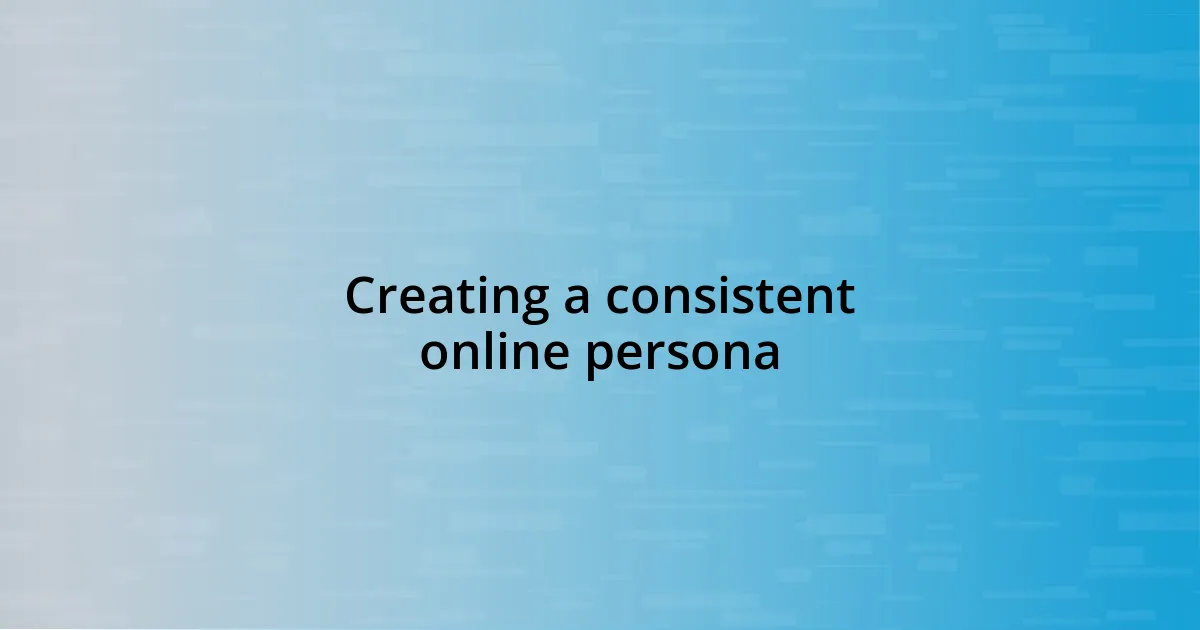
Creating a consistent online persona
Creating a consistent online persona is about aligning every aspect of your digital presence with those core values I mentioned earlier. For me, consistency meant sharing not just my successes but also my challenges. I remember a post where I shared my struggles with anxiety—an experience that resonated with many of my followers. It reminded me that vulnerability is a strength, and when I opened up, it deepened the trust my audience placed in me.
I’ve found that using a similar tone, style, and visual aesthetic across different platforms enhances my online presence. I tend to use light-hearted humor and relatable language, which I believe makes my content feel approachable. Sometimes, I ask myself, “Would my grandmother understand this post?” If the answer is yes, I know I’ve hit the mark. This simple measure keeps me focused on clarity and relatability.
Moreover, I regularly revisit my online persona to ensure it reflects who I am in real life. Last month, I noticed my posts were becoming overly polished and less personal. It struck me that I hadn’t been sharing enough behind-the-scenes moments. I decided to change that, and after posting a candid photo of my workspace, I was overwhelmed by the positive response. It made me realize that people crave authenticity and the real stories behind the curated images. What parts of your life can you share to make your online persona more relatable?

Engaging genuinely with your audience
Engaging genuinely with your audience requires active listening and sincere interaction. I recall a time when I received a heartfelt comment on one of my posts. Instead of just liking it, I took the time to respond personally, sharing my own related experience. It struck me how much deeper our connection felt afterward—not just for them, but for me too. Engaging in this way equips us to build a community based on trust and empathy.
The reality is that every comment or message from my audience holds the potential for a meaningful exchange. I often ask myself, “How can I respond to not just acknowledge but truly connect?” For example, when someone shares their struggles with mental health, I don’t just offer advice; I share my journey, too. This vulnerability opens the door for others to feel safe in sharing their own stories, fostering authenticity in our interactions.
In this digital space, emojis and likes can’t replace the warmth of a genuine connection. I’ve learned that inviting dialogue creates a sense of belonging among my followers. Whether I’m posing a thought-provoking question or simply thanking someone for their support, I’ve found that being accessible and personal makes the online experience so much richer. What moments can you create in your interactions to cultivate that same sense of belonging?
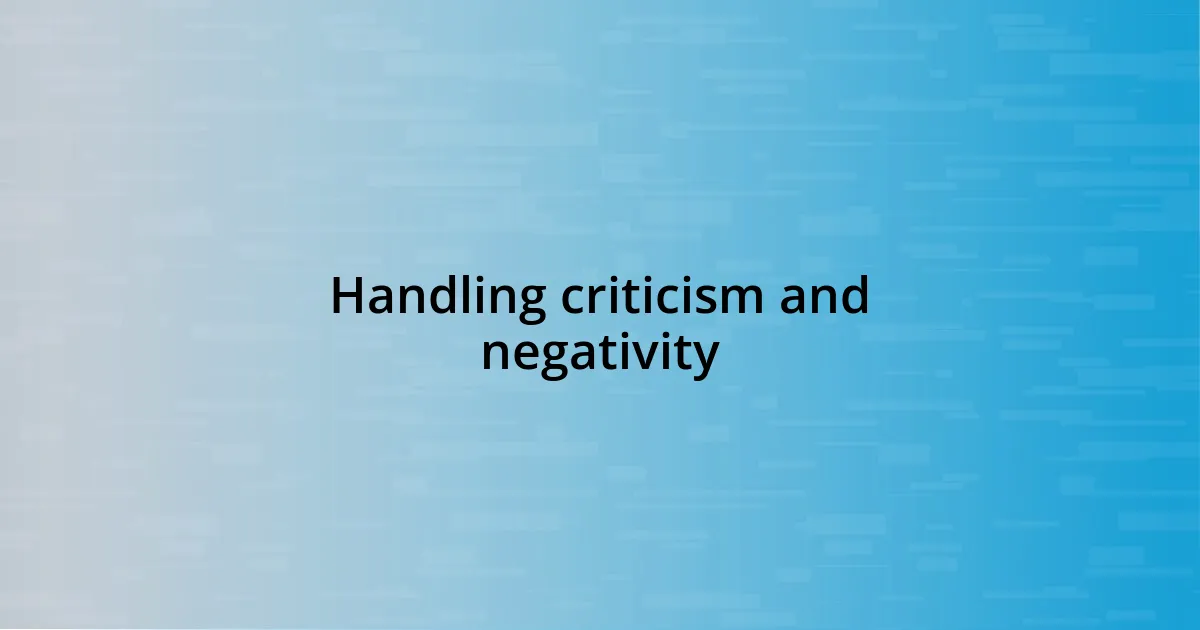
Handling criticism and negativity
Handling criticism is quite the balancing act. I vividly remember a time when a public post of mine was met with harsh feedback. At first, it stung. I mean, who enjoys being criticized, right? But then I realized it was an opportunity to reflect. By addressing the critique openly, I turned a negative experience into a moment of connection. I thanked the commenter for their perspective, which led to a constructive conversation. It reminded me that differing opinions can foster growth rather than resentment.
Negativity, especially online, can feel overwhelming. There was a period when I received a string of negative comments about my content not being “deep enough.” Instead of getting defensive, I took a step back and asked myself what I could learn from their viewpoints. I acknowledged their feelings in my response and shared how everyone’s definition of depth varies. This approach helped me develop a thicker skin while staying true to my voice. Have you ever considered how negativity might just be a distorted reflection of someone else’s insecurities?
I find that a strong support system can be invaluable when navigating criticism. On particularly tough days, I lean on friends who understand the digital landscape. One evening, after confronting some harsh remarks, I shared my frustrations over coffee with a fellow creator. To my surprise, they’d faced similar experiences. This connection lightened my burden and reminded me that I’m not alone in this journey. How do you process criticism to ensure it doesn’t derail your authenticity?
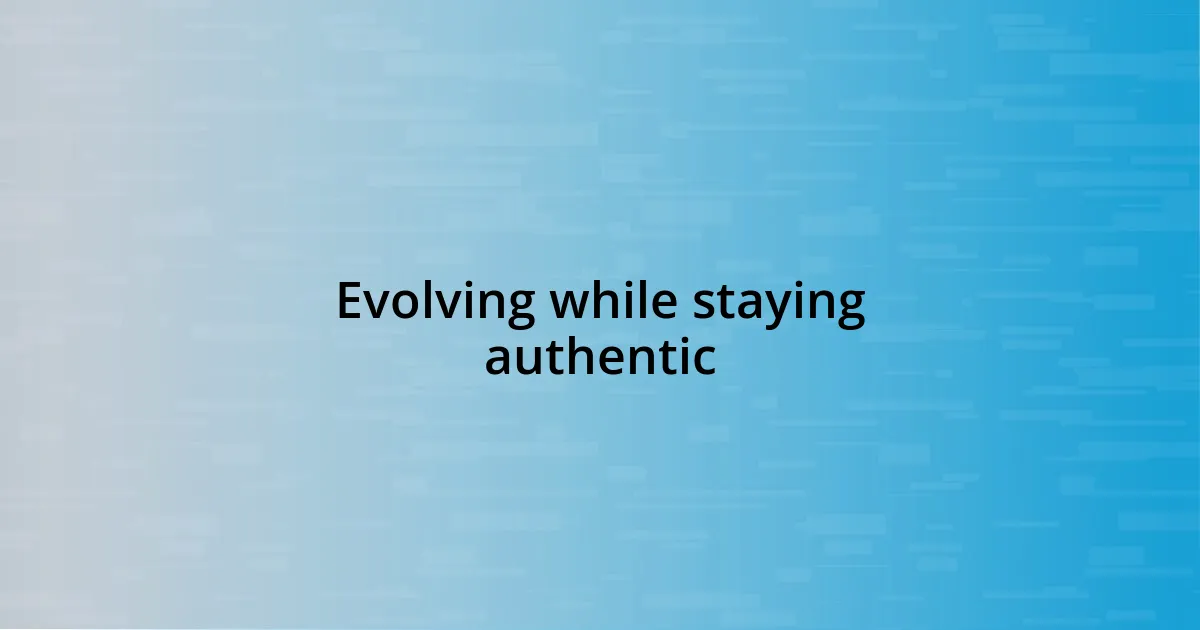
Evolving while staying authentic
Evolving in my online presence while maintaining authenticity has been a fascinating journey. I recall a time when I decided to branch out and explore new content formats. When I started incorporating videos into my posts, I felt a mix of excitement and vulnerability. Sharing my face and voice added a new layer of intimacy, but it also challenged me to stay true to my original message. I often wonder, how can I continue to innovate without losing sight of who I am? This reflective approach has led me to refine my content, keeping my core values at the forefront.
I’ve learned that change doesn’t have to mean losing authenticity. For instance, my style evolved from written blogs to vibrant social media stories that included personal moments from my life. I remember posting about celebrating a small victory in my career with simple snapshots—this not only allowed me to share my journey but resonated with others facing similar struggles. Have you ever thought about how sharing your ups and downs could help others feel more connected to you? It’s that relatability that keeps me grounded while embracing new possibilities.
There are times when exploring new themes can feel daunting. I distinctly remember transitioning into more thoughtful topics around mental wellness. Initially, I was apprehensive, fearing it might alienate some of my audience. However, when I shared a story about my own anxiety during a challenging period, I was met with overwhelming support and gratitude. This experience reinforced my belief that authenticity breeds connection, which inspires me to continually evolve. How do you navigate the uncertainty of change while holding on to your essence?









